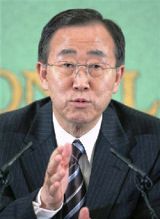UN chief alarmed by delay in Darfur force deployment
November 12, 2007 (UNITED NATIONS) — The U.N. chief appealed to the Sudanese government and other member states to step up efforts to facilitate the deployment of a planned peacekeeping force in Darfur, expressing concern at repeated delays.
 “I am concerned that the security incidents over the past month and the continuing delays in the deployment of UNAMID (African Union-United Nations Hybrid Operation in Darfur) could lead to a further deterioration in the situation on the ground,” said Secretary-General Ban Ki-moon in a report officially released Monday.
“I am concerned that the security incidents over the past month and the continuing delays in the deployment of UNAMID (African Union-United Nations Hybrid Operation in Darfur) could lead to a further deterioration in the situation on the ground,” said Secretary-General Ban Ki-moon in a report officially released Monday.
Ban said deteriorating security and increased violence on both sides in recent months, including an attack on an African peacekeeping base in late September that left 10 people dead, “suggests the need to deploy a robust and credible force to Darfur is urgent.”
He appealed to the Sudanese government to approve a list of potential troop-contributing countries to the 26,000-strong joint U.N.-AU force, which is meant to assume responsibility for Darfur on Dec. 31.
At Sudan’s insistence, the U.N. Security Council agreed that the force be predominantly African, but a list provided to the government on Oct. 2 has yet to be approved, said Ban.
“I call on the government to agree to the troop composition of UNAMID,” said Ban. “This force composition is predominantly African … and provides for a force that would meet United Nations standards and would be capable of deploying in a timely manner.”
Ban also called on member states to provide necessary military equipment, particularly helicopters, for the hybrid force. The U.N. has not yet received any pledges for military helicopters, which are necessary for the mission’s success, he said.
“It is urgent, at this time, that those member states which are in a position to contribute the missing transportation and aviation capabilities for UNAMID to do so,” said Ban. “Without these critical units, the mission will not be able to implement its mandate.”
The aim of the force is to stop fighting that has killed more than 200,000 people and displaced 2.5 million since ethnic African rebels took up arms against the Arab-dominated government in 2003, accusing it of discrimination. Sudan is accused of retaliating by unleashing Arab militias responsible for much of the violence — an accusation the government denies.
Ban said he was hopeful that highly anticipated U.N.-AU-brokered talks on Darfur opened late last month in Libya, although they were quickly postponed until December.
“The beginning of peace talks on 27 October in Sirte represents a unique opportunity to achieve a definitive end to the suffering of the people of Darfur, who continue to be threatened by violence and insecurity and to languish in camps,” said Ban.
(AP)
